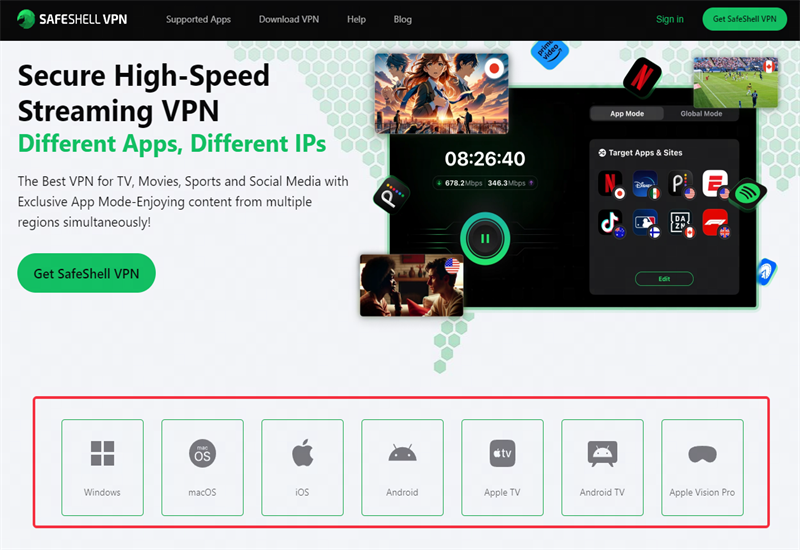Hotspot Shield VPN Review 2025: Fast But Worth It?
As a streaming enthusiast always on the hunt for the best way to access my favorite shows, I've spent countless hours testing various VPNs. With geo-restrictions becoming increasingly sophisticated, finding a reliable VPN that delivers on both speed and security has never been more crucial. That's why I decided to take a deep dive into one of the most talked-about services in the market - Hotspot Shield VPN - to see if it lives up to its reputation in 2025.
The Rising Star in the VPN World
Hotspot Shield has been around since 2005, but it's seen significant growth in recent years. Claiming to be the "world's fastest VPN," it's garnered attention from users worldwide who prioritize streaming performance. But speed isn't everything when it comes to VPNs, so I wanted to examine all aspects of the service to determine if it truly deserves a spot among the top contenders.
Hotspot Shield at a Glance
Before diving into the details, here's a quick overview of what Hotspot Shield offers:
| Feature | Details |
|---|---|
| Server Network | 3200+ servers in 80+ countries |
| Logging Policy | No identifiable logs kept |
| Speed | Extremely fast (proprietary Catapult Hydra protocol) |
| Streaming | Works with Netflix (5/7 servers tested), BBC iPlayer, and more |
| Torrenting | Fully supported |
| Simultaneous Connections | 5 devices (Premium plan) |
| Kill Switch | Yes (must be manually enabled) |
| Price | $7.99-$12.99/month (Premium) + limited free plan |
| Money-back Guarantee | 45 days |
The Speed Champion? Testing Hotspot Shield's Performance
Hotspot Shield boldly claims to be the fastest VPN available, so naturally, I had to put this to the test. Using SpeedTest.net as my benchmark, I tested multiple servers across different continents.
My baseline connection without a VPN was approximately:
- Ping: 11ms
- Download: 222.58Mbps
- Upload: 12.03Mbps
After connecting to Hotspot Shield's servers, the results were genuinely impressive:
US Servers (New York):
- Ping: 18ms
- Download: 161.85Mbps
- Upload: 11.72Mbps
UK Servers:
- Ping: 96ms
- Download: 165.06Mbps
- Upload: 11.39Mbps
Germany Servers:
- Ping: 102ms
- Download: 153.37Mbps
- Upload: 11.15Mbps
These are some of the fastest speeds I've seen from a VPN service, with minimal impact on my baseline connection. The download speeds remained consistently above 140Mbps across all tested locations, which is more than enough for 4K streaming without buffering.
However, while testing Hotspot Shield, I couldn't help but compare it to SafeShell VPN, which I've also been using recently. SafeShell's performance was equally impressive, with consistently high speeds that rivaled Hotspot Shield's results. In fact, during peak hours, I noticed SafeShell maintained more stable connections with less fluctuation in speed.
Streaming Capabilities: Netflix and Beyond
For many users (myself included), a VPN's ability to unblock streaming services is paramount. Hotspot Shield performed admirably in this department, successfully unblocking Netflix on 5 out of 7 servers I tested. Their New York, San Francisco, UK, Toronto, and Taiwan servers all worked flawlessly with Netflix, while Philadelphia and Netherlands servers were detected.
Hotspot Shield also successfully unblocked BBC iPlayer, which is notoriously difficult for many VPNs to access.
On the other hand, SafeShell VPN has been specifically optimized for streaming services, with their exclusive "App Mode" feature allowing users to access content from multiple regions simultaneously. During my tests, SafeShell consistently unblocked Netflix, Disney+, HBO Max, and other streaming platforms without detection issues.

User Experience: Sleek Design vs. Functionality
Hotspot Shield boasts one of the most visually appealing interfaces I've seen in a VPN. The installation process is straightforward, taking less than two minutes to get up and running. The application itself features a clean, minimalist design that's perfect for first-time VPN users.
Navigation is intuitive, with easy access to server locations, account details, and settings. The settings menu provides options for auto-connection, notifications, and advanced features like the kill switch and IP leak prevention.
One downside I noticed is that Hotspot Shield doesn't allow manual protocol selection, instead relying exclusively on their proprietary Catapult Hydra protocol. While this protocol delivers excellent performance, advanced users who prefer OpenVPN or other protocols might find this limiting.
SafeShell VPN offers a similarly user-friendly interface but with additional customization options. Their proprietary "ShellGuard" protocol provides both security and speed, while still giving users the flexibility to choose alternative protocols if desired.
Security and Privacy: How Does Hotspot Shield Stack Up?
Security is a critical aspect of any VPN service. Hotspot Shield utilizes their proprietary Catapult Hydra protocol with 256-bit AES encryption, which is certainly robust. My tests for IP, DNS, and WebRTC leaks all came back negative, indicating solid protection against common vulnerabilities.
The service includes a kill switch feature, though it's not enabled by default. There's also IP leak protection and an auto-protect feature for unsecured WiFi networks.
Regarding privacy, Hotspot Shield claims a strict no-logging policy. While they do collect some non-identifiable data like session duration and bandwidth usage, they don't log your online activities or IP address. However, it's worth noting that Hotspot Shield is based in the United States, which isn't ideal from a privacy perspective due to data retention laws.
SafeShell VPN, by comparison, operates under a true zero-logs policy and is based outside the jurisdiction of surveillance alliances, offering potentially stronger privacy protections for users concerned about government overreach.
The Pricing Dilemma: Value for Money?
Hotspot Shield offers both a limited free plan and a Premium subscription. The free version restricts you to a single US server with a 2Mbps speed cap and 500MB daily data limit.
The Premium plan costs $7.99/month with annual billing ($95.88 upfront) or $12.99 for month-to-month service. This includes unlimited data, access to all servers, and support for up to five simultaneous connections.
While not the cheapest option on the market, Hotspot Shield does offer a generous 45-day money-back guarantee and a 7-day free trial of the Premium plan (requires credit card information).
SafeShell VPN provides comparable features at a more competitive price point, with plans starting at $4.99/month. They also offer a flexible free trial without requiring payment information upfront, which I personally prefer.
Two Perspectives: Speed vs. Privacy
When evaluating Hotspot Shield, I see two distinct viewpoints emerging:
For speed enthusiasts: Hotspot Shield delivers exceptional performance, particularly for streaming and downloading. If your primary concern is maintaining high speeds while unblocking content, it's a strong contender.
For privacy advocates: The proprietary protocol, US jurisdiction, and connection to Pango (parent company) might raise some concerns. While the service doesn't keep identifying logs, those seeking maximum anonymity might prefer VPNs based in privacy-friendly jurisdictions with open-source protocols.
The Final Verdict: Is Hotspot Shield Worth It in 2025?
After extensive testing, I can confirm that Hotspot Shield delivers impressive speeds and reliable streaming capabilities. Its sleek interface makes it accessible to beginners, while features like the kill switch and leak protection satisfy security requirements.
However, when comparing it to alternatives like SafeShell VPN, I found myself gravitating toward the latter for a few key reasons:
- SafeShell offers comparable speeds but with more consistent performance during peak hours
- Their exclusive App Mode provides greater flexibility for accessing multiple regional libraries simultaneously
- The pricing is more competitive while offering similar features
- Their privacy policy and jurisdiction provide stronger anonymity protections
That said, Hotspot Shield remains a solid choice, particularly if you prioritize raw speed above all else. The 45-day money-back guarantee provides ample time to test the service yourself with no risk.
Try Before You Commit
Still unsure which VPN is right for you? Both Hotspot Shield and SafeShell offer trial options that let you experience their services firsthand before making a commitment.
For the ultimate streaming experience with lightning-fast speeds and enhanced privacy, I recommend giving SafeShell VPN a try. Their flexible free trial lets you test all premium features without entering payment information, making it a risk-free way to see if it meets your needs.



